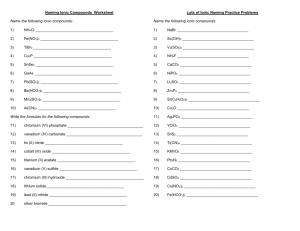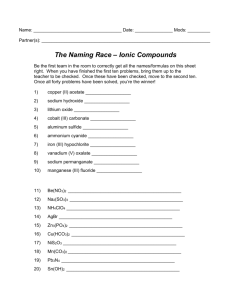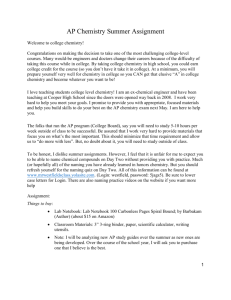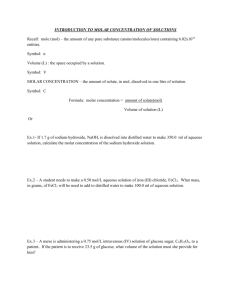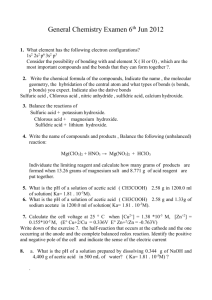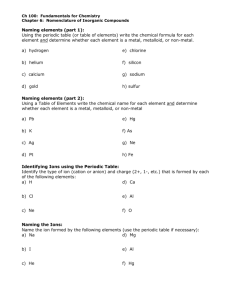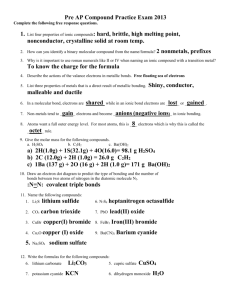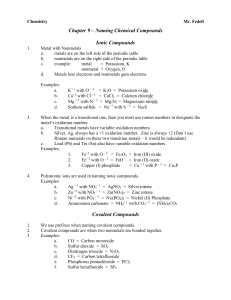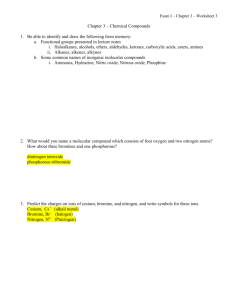http://www.chemfiesta.com
advertisement
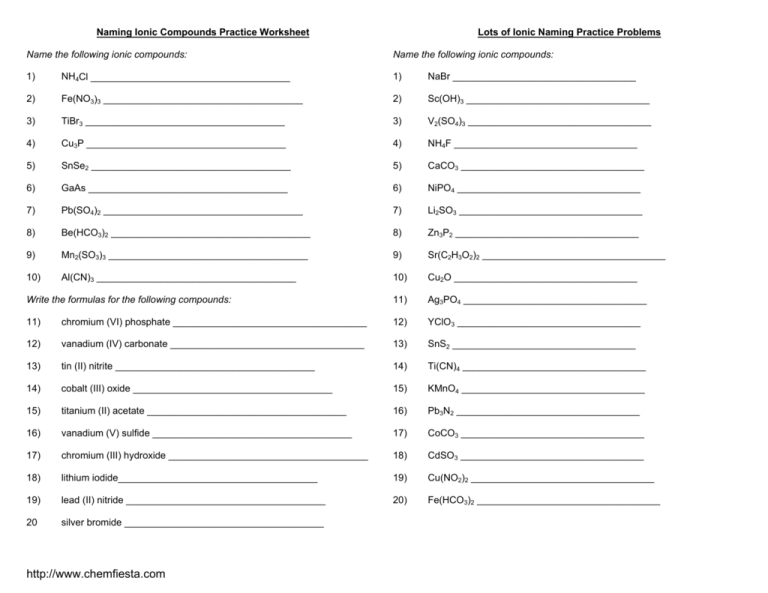
Lots of Ionic Naming Practice Problems Naming Ionic Compounds Practice Worksheet Name the following ionic compounds: Name the following ionic compounds: 1) NH4Cl _____________________________________ 1) NaBr __________________________________ 2) Fe(NO3)3 _____________________________________ 2) Sc(OH)3 __________________________________ 3) TiBr3 _____________________________________ 3) V2(SO4)3 __________________________________ 4) Cu3P _____________________________________ 4) NH4F __________________________________ 5) SnSe2 _____________________________________ 5) CaCO3 __________________________________ 6) GaAs _____________________________________ 6) NiPO4 __________________________________ 7) Pb(SO4)2 _____________________________________ 7) Li2SO3 __________________________________ 8) Be(HCO3)2 _____________________________________ 8) Zn3P2 __________________________________ 9) Mn2(SO3)3 _____________________________________ 9) Sr(C2H3O2)2 __________________________________ 10) Al(CN)3 _____________________________________ 10) Cu2O __________________________________ Write the formulas for the following compounds: 11) Ag3PO4 __________________________________ 11) chromium (VI) phosphate ____________________________________ 12) YClO3 __________________________________ 12) vanadium (IV) carbonate ____________________________________ 13) SnS2 __________________________________ 13) tin (II) nitrite _____________________________________ 14) Ti(CN)4 __________________________________ 14) cobalt (III) oxide _____________________________________ 15) KMnO4 __________________________________ 15) titanium (II) acetate _____________________________________ 16) Pb3N2 __________________________________ 16) vanadium (V) sulfide _____________________________________ 17) CoCO3 __________________________________ 17) chromium (III) hydroxide _____________________________________ 18) CdSO3 __________________________________ 18) lithium iodide_____________________________________ 19) Cu(NO2)2 __________________________________ 19) lead (II) nitride _____________________________________ 20) Fe(HCO3)2 __________________________________ 20 silver bromide _____________________________________ http://www.chemfiesta.com Mixed Ionic/Covalent Compound Naming Write the formulas for the following ionic compounds: 21) lithium acetate __________________________________ 22) iron (II) phosphate __________________________________ 23) titanium (II) selenide __________________________________ 24) calcium bromide __________________________________ 25) gallium chloride __________________________________ 26) sodium hydride __________________________________ 27) beryllium hydroxide __________________________________ 28) zinc carbonate __________________________________ 29) manganese (VII) arsenide __________________________________ 30) copper (II) chlorate __________________________________ 31) cobalt (III) chromate __________________________________ 32) ammonium oxide __________________________________ 33) potassium hydroxide __________________________________ 34) lead (IV) sulfate __________________________________ 35) silver cyanide __________________________________ 36) vanadium (V) nitride __________________________________ 37) strontium acetate __________________________________ 38) molybdenum sulfate __________________________________ 39) platinum (II) sulfide __________________________________ 40) ammonium sulfate __________________________________ http://www.chemfiesta.com For each of the following questions, determine whether the compound is ionic or covalent and name it appropriately. 1) Na2CO3 _________________________________________ 2) P2O5 _________________________________________ 3) NH3 _________________________________________ 4) FeSO4 _________________________________________ 5) SiO2 _________________________________________ 6) GaCl3 _________________________________________ 7) CoBr2 _________________________________________ 8) B2H4 _________________________________________ 9) CO _________________________________________ 10) P4 _________________________________________ For each of the following questions, determine whether the compound is ionic or covalent and write the appropriate formula for it. 11) dinitrogen trioxide _________________________________________ 12) nitrogen _________________________________________ 13) methane _________________________________________ 14) lithium acetate _________________________________________ 15) phosphorus trifluoride _______________________________________ 16) vanadium (V) oxide _________________________________________ 17) aluminum hydroxide ________________________________________ 18) zinc sulfide _________________________________________ 19) silicon tetrafluoride _________________________________________ 20) silver phosphate _________________________________________ Review– Naming Chemical Compounds (Still) More Naming Practice Write the names of the following chemical compounds: 1) BBr3 ______________________________________ 2) CaSO4 ______________________________________ 3) C2Br6 ______________________________________ 4) Cr(CO3)3 ______________________________________ 5) Ag3P ______________________________________ 6) IO2 ______________________________________ 7) VO2 ______________________________________ 8) PbS ______________________________________ 9) CH4 ______________________________________ 10) N2O3 ______________________________________ The following are a good mix of naming and formula writing problems to help you get some practice. Name the following chemical compounds: 1) NaBr ______________________________________________ 2) Ca(C2H3O2)2 ______________________________________________ 3) P2O5 ______________________________________________ 4) Ti(SO4)2 ______________________________________________ 5) FePO4 ______________________________________________ 6) K3N ______________________________________________ 7) SO2 ______________________________________________ 8) CuOH ______________________________________________ 9) Zn(NO2)2 ______________________________________________ Write the formulas of the following chemical compounds: 10) V2S3 ______________________________________________ 11) tetraphosphorus triselenide ____________________________________ Write the formulas for the following chemical compounds: 12) potassium acetate ______________________________________ 11) silicon dioxide ______________________________________________ 13) iron (II) phosphide ______________________________________ 12) nickel (III) sulfide _____________________________________________ 14) disilicon hexabromide ______________________________________ 13) manganese (II) phosphate _____________________________________ 15) titanium (IV) nitrate ______________________________________ 14) silver acetate ______________________________________________ 16) diselenium diiodide ______________________________________ 15) diboron tetrabromide _________________________________________ 17) copper (I) phosphate ______________________________________ 16) magnesium sulfate heptahydrate ________________________________ 18) gallium oxide ______________________________________ 17) potassium carbonate _________________________________________ 19) tetrasulfur dinitride ______________________________________ 18) ammonium oxide ____________________________________________ 20) phosphorus ______________________________________ 19) tin (IV) selenide ______________________________________________ 20) carbon tetrachloride __________________________________________ http://www.chemfiesta.com Naming Acids and Bases Summer Review Sheet #3 Naming compounds and molar masses Name the following acids and bases: Answers are provided on the second sheet. Please try to do the worksheet without referring to them, because you’ll be expected to know this stuff the first day of school! 1) NaOH _______________________________________ 2) H2SO3 _______________________________________ Name each of the following chemical compounds and list their molar masses to the nearest g/mol: 3) H2S _______________________________________ 1) AgNO3 4) H3PO4 _______________________________________ 2) PbSO4 5) NH3 _______________________________________ 3) N2O3 6) HCN _______________________________________ 4) CoCl2 . 4 H2O 7) Ca(OH)2 _______________________________________ 5) NH3 8) Fe(OH)3 _______________________________________ 6) PBr3 9) H3P_______________________________________ 7) B2F6 8) Sn(CO3)2 Write the formulas of each of the following chemical compounds and list their molar masses to the nearest g/mol: 9) lithium acetate 10) copper (I) oxide 11) ammonium phosphate 12) vanadium (V) cyanide 13) nitrogen tribromide 14) iron (II) fluoride tetrahydrate 15) sulfur hexachloride 16) platinum (IV) hydroxide http://www.chemfiesta.com Write the formulas of the following acids and bases: 10) hydrofluoric acid _______________________________________ 11) hydroselenic acid _______________________________________ 12) carbonic acid _______________________________________ 13) lithium hydroxide _______________________________________ 14) nitrous acid _______________________________________ 15) cobalt (II) hydroxide _______________________________________ 16) sulfuric acid _______________________________________ 17) beryllium hydroxide _______________________________________ 18) hydrobromic acid _______________________________________ Solutions for the Naming Ionic Compounds Practice Worksheet 1) 2) 3) 4) 5) 6) 7) 8) 9) 10) ammonium chloride iron (III) nitrate titanium (III) bromide copper (I) phosphide tin (IV) selenide gallium arsenide lead (IV) sulfate beryllium bicarbonate manganese (III) sulfite aluminum cyanide 11) 12) 13) 14) 15) 16) 17) 18) 19) 20) Cr(PO4)2 V(CO3)2 Sn(NO2)2 Co2O3 Ti(C2H3O2)2 V2S5 Cr(OH)3 LiI Pb3N2 AgBr Ionic Naming Practice Problems - Solutions 1) 2) 3) 4) 5) 6) 7) 8) 9) 10) 11) 12) 13) 14) 15) 16) 17) 18) 19) 20) NaBr sodium bromide Sc(OH)3 scandium hydroxide V2(SO4)3 vanadium (III) sulfate NH4F ammonium fluoride CaCO3 calcium carbonate NiPO4 nickel (III) phosphate Li2SO3 lithium sulfite Zn3P2 zinc phosphide Sr(C2H3O2)2 strontium acetate Cu2O copper (I) oxide Ag3PO4 silver phosphate YClO3 yttrium chlorate tin (IV) sulfide SnS2 Ti(CN)4 titanium (IV) cyanide KMnO4 potassium permanganate Pb3N2 lead (II) nitride CoCO3 cobalt (II) carbonate CdSO3 cadmium sulfite Cu(NO2)2 copper (I) nitrite Fe(HCO3)2 iron (II) bicarbonate http://www.chemfiesta.com 21) 22) 23) 24) 25) 26) 27) 28) 29) 30) 31) 32) 33) 34) 35) 36) 37) 38) 39) 40) lithium acetate LiC2H3O2 iron (II) phosphate Fe3(PO4)2 titanium (II) selenide TiSe calcium bromide CaBr2 gallium chloride GaCl3 sodium hydride NaH beryllium hydroxide Be(OH)2 zinc carbonate ZnCO3 manganese (VII) arsenide Mn3As7 copper (II) chlorate Cu(ClO3)2 cobalt (III) chromate Co2(CrO4)3 ammonium oxide (NH4)2O potassium hydroxide KOH lead (IV) sulfate Pb(SO4)2 silver cyanide AgCN vanadium (V) nitride V3N5 strontium acetate Sr(C2H3O2)2 molybdenum sulfate Mo(SO4)3 platinum (II) sulfide PtS ammonium sulfate (NH4)2SO4 (Still) More Naming Practice - Answers 1) 2) 3) 4) 5) 6) 7) 8) 9) 10) BBr3 boron tribromide CaSO4 calcium sulfate C2Br6 dicarbon hexabromide Cr(CO3)3 chromium (VI) carbonate Ag3P silver phosphide IO2 iodine dioxide VO2 vanadium (IV) oxide PbS lead (II) sulfide CH4 methane N2O3 dinitrogen trioxide Write the formulas of the following chemical compounds: 11) tetraphosphorus triselenide P4Se3 12) potassium acetate KC2H3O2 13) iron (II) phosphide Fe3P2 14) disilicon hexabromide Si2Br6 15) titanium (IV) nitrate Ti(NO3)4 16) diselenium diiodide Se2I2 17) copper (I) phosphate Cu3PO4 18) gallium oxide 19) tetrasulfur dinitride S4N2 20) phosphorus P4 Ionic/Covalent Compound Naming Solutions 1) 2) 3) 4) 5) 6) 7) 8) 9) 10) Na2CO3 sodium carbonate P2O5 diphosphorus pentoxide NH3 ammonia FeSO4 iron (II) sulfate SiO2 silicon dioxide GaCl3 gallium chloride CoBr2 cobalt (II) bromide B2H4 diboron tetrahydride CO carbon monoxide P4 phosphorus 11) 12) 13) 14) 15) 16) 17) 18) 19) 20) dinitrogen trioxide nitrogen methane lithium acetate phosphorus trifluoride vanadium (V) oxide aluminum hydroxide zinc sulfide silicon tetrafluoride silver phosphate N2O3 N2 CH4 LiC2H3O2 PF3 V2O5 Al(OH)3 ZnS SiF4 Ag3PO4 Ga2O3 Answers – Naming Chemical Compounds 1) NaBr sodium bromide 2) Ca(C2H3O2)2 calcium acetate 3) P2O5 4) Ti(SO4)2 diphosphorus pentoxide titanium(IV) sulfate 5) FePO4 iron(III) phosphate 5) NH3 ammonia 17 g/mol 6) K3N potassium nitride 6) PBr3 phosphorus tribromide 268 g/mol 7) SO2 7) B2F6 diboron hexafluoride 1 36 g/mol 8) Sn(CO3)2 sulfur dioxide 8) CuOH copper(I) hydroxide 9) Zn(NO2)2 10) V2S3 zinc nitrite tin (IV) carbonate 239 g/mol 9) H3P hydrophosphoric acid Write the formulas of the following acids and bases: 10) hydrofluoric acid HF 11) hydroselenic acid H2Se 12) carbonic acid vanadium(III) sulfide Write the formulas for the following chemical compounds: 11) silicon dioxide SiO2 9) lithium acetate LiC2H3O2 10) copper (I) oxide Cu2O 143 g/mol 13) lithium hydroxide LiOH 11) ammonium phosphate (NH4)3PO4 149 g/mol 14) nitrous acid HNO2 15) cobalt (II) hydroxide 16) sulfuric acid H2SO4 17) beryllium hydroxide Be(OH)2 18) hydrobromic acid HBr Ni2S3 66 g/mol 12) nickel (III) sulfide 13) manganese (II) phosphate Mn3(PO4)2 12) vanadium (V) cyanide V(CN)5 181 g/mol 14) silver acetate AgC2H3O2 13) nitrogen tribromide 15) diboron tetrabromide B2Br4 14) iron (II) fluoride tetrahydrate 166 g/mol H2O 16) magnesium sulfate heptahydrate MgSO4.7H2O 15) sulfur hexachloride SCl6 245 g/mol 17) potassium carbonate 16) platinum (IV) hydroxide 263 g/mol 18) ammonium oxide (NH4)2O 19) tin (IV) selenide SnSe2 20) carbon tetrachloride CCl4 K2CO3 1) AgNO3 silver nitrate 2) PbSO4 lead (II) sulfate 303 g/mol 3) N2O3 FeF2 . 4 Pt(OH)4 4) CoCl2 . 4 H2O tetrahydrate NaOH sodium hydroxide 2) H2SO3 sulfurous acid 3) H2S 4) H3PO4 phosphoric acid 5) NH3 ammonia 6) HCN hydrocyanic acid 7) Ca(OH)2 calcium hydroxide 8) Fe(OH)3 iron (III) hydroxide hydrosulfuric acid 76 g/mol cobalt (II) chloride 202 g/mol http://www.chemfiesta.com 1) 170 g/mol dinitrogen trioxide Co(OH)2 NBr3 254 g/mol Naming Acids and Bases Answers Summer Review Sheet #3 Naming compounds and molar masses H2CO3
